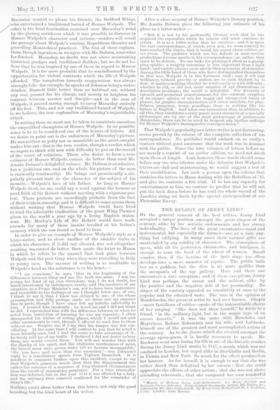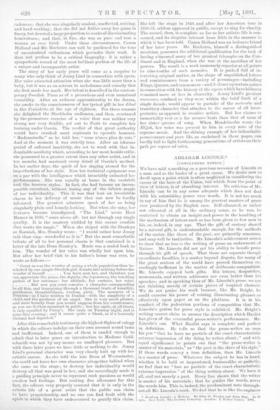THE EULOGY OF JENNY LIND.*
BY the general consent of the hest critics, Jenny Lind occupied a unique position amongst the great singers of the century, alike by her artistic endowments and her strong individuality. The lives of the great executants—vocal and instrumental, but especially the former—are, as a rule, any-. thing but edifying. In many cases their natural gifts are unattended by any solidity of character. The atmosphere of opera, with all its jealousies, chicaneries, and intrigues, is enough to turn the head of the wisest of women. Small wonder, then, if the heroine of the lyric stage too often develops into a mere monster of caprice. The public hails her as a goddess, but the diva is no more godlike than the occupants of the top gallery. Here and there one encounters a rare exception ; and of these exceptions, Jenny Lind was perhaps the rarest and the noblest, alike by the positive and the negative side of her personality. No. singer of the century appealed so irresistibly at once to the popular and the educated taste. She was, in the opinion of Mendelssohn, the greatest artist he had ever known. Chopin —most fastidious of critics—spoke of the indescribable charm of her singing. "She does not show herself," he wrote to a friend, "in the ordinary light, but in the magic rays of an aurora borealis." It was the same with Moscheles and Meyerbeer, Robert Schumann and his wife, and Lablache, himself one of the greatest and most accomplished artists of the century. As to the furore which she created amongst the- average opera-goers, it is hardly necessary to speak. Mr. Rockstro went near losing his life in one of the historic crushes during the Jenny Lind mania in 1847, a mania which was not confined to London, but raged alike in Stockholm and Berlin, in Vienna and New York. So much for the effect produced on her hearers. As for herself, it is enough to say that she was. rather dazed than delighted by her success ; that she could appreciate the efforts of other artists ; that she was not above attending rehearsals ; that she composed her own wonderful * Memoir of Madams Team! Liad.Cialaschatiat : her Early Art-Life and Dramatic Career, 1520485j. From Original Documents, Letters, MS. Diaries, &e., oolleotod by Mr. Otto Goldsolunidt, By Henry Scott Holland and W. S. ltookstro,. 2 vols. London : John Murray.
cadenzas ; that she was singularly modest, unaffected, retiring, and hard-working ; that she did not fritter away her gains in finery, but devoted a large proportion to works of discriminating benevolence; and that, in fine, she was as pure and true a woman as ever lived. Under these circumstances, Canon Holland and Mr. Rockstro can well be pardoned for the tone -of unrestrained enthusiasm which pervades their work. It does not profess to be a critical biography : it is rather a sympathetic record of the most brilliant portion of the life of -a unique and incomparable artist.
The story of her early years will come as a surprise to many who only think of Jenny Lind in connection with opera. Her voice attracted attention when she was little more than a baby, but it was as an actress in melodrama and comedy that she first made her mark. Her talent is described in the contem- porary Swedish Press as of a precocious and even unnatural versatility. After an arduous apprenticeship to the drama, she awoke to the consciousness of her lyrical gift in her (Mat in Der Freischiitz, at the age of eighteen. For three seasons she delighted the Stockholm audiences, and then, overtaxed by the premature exercise of a voice that was neither very strong nor very flexible, set out to Paris to complete her training under Garcia. The verdict of that great authority would have crushed most aspirants to operatic honours.
Mademoiselle," so he told her, " vous n'avez plus de voix." And at the moment it was strictly true. After an irksome period of enforced inactivity, she set to work with that in- domitable assiduity which, according to her most hostile critic, she possessed to a greater extent than any other artist, and in ten months had mastered every detail of Garcia's method. In her earlier days, the spirit of her singing atoned for the imperfections of her style. Now her technical equipment was on a par with the intelligence which invariably animated her performanees. She was equally at home in the eaniabile and the bravura styles. In fact, she had become an incom- parable executant, without losing any of the inborn magic of her individuality. This it was that lent an irresistible charm to her delivery of music that can now be hardly tolerated. Her greatest admirers speak of her as being singularly plain and homely-looking. But when she sang, her features became transfigured. "The Lind," wrote Herr Hauser in 1846, "soars above : but not through any single -quality. It is the mastery wielded by this anima candida that works the magic." When she stayed with the Stanleys at Norwich, Mrs. Stanley wrote : "I would rather hear Jenny talk than sing—wonderful as it is." But the most remarkable 'tribute of all to her personal charm is that contained in a letter of the late Dean Stanley's. Music was a sealed book to 'him. The wonder of her voice was wholly lost upon him. But after her brief visit to his father's house was over, he wrote as follows :—
" Great as was the wonder of seeing a whole population thus be- witched by one simple Swedish girl, it sinks into nothing before the
wonder of herself You have seen her, and therefore you can appreciate the grace, the dignity, the joyousness, the touching pathos of her entrance: her attitude, her curtsies, her voice. • But now you must conceive a character corresponding
to all this, and transpiring through a thousand traits of humility, ,gentleness, thoughtfulness, wisdom, piety. The manners of a Princess—as I have written to Donkin—with the simplicity of a ,child, and the goodness of an angel. She is very much plainer, .and more homely than you would suppose from her countenance, as you see it when animated in public ; but her smile, at all times, is only equalled by Pusey's. She came on Tuesday night, and is
gone this evening ; and it seems quite a blank, as if a heavenly 'visitant had departed."
After this remarkable testimony, the highest flights of eulogy in which the editors indulge on their own account sound tame and ineffectual. Indeed, one of them is candid enough to -admit that in later years an introduction to Madame Gold- schmidt was not by any means an unalloyed pleasure. But with these later years we have little or nothing to do. Jenny Lid's personal character was very closely knit up with her 'artistic career. As she told the late Dean of Westminster, 'she could not leave her own character altogether behind when she came on the stage ; to destroy her individuality would -destroy all that was good in her, and she accordingly made it a guiding principle never to represent such passions as would -awaken bad feelings. But making due allowance for this fact, the editors very properly contend that it is only in the • artistic life of a great artist that the public can claim to have proprietorship, and no one can find fault with the ,spirit in which they have endeavoured to gratify this claim. She left the stage in 1849, and after her American tour in 1850-M, seldom appeared in public, except to sing for charity. The record, then, is complete so far as her artistic life is con- cerned, and its singular interest loses little in the manner in which it has been told. Canon Holland was an intimate friend of her later years. Mr. Rockstro, himself a distinguished musician, possesses the additional qualification for the task of having witnessed many of her greatest triumphs on the Con- tinent and in England, when she was at the meridian of her powers. The result is a work immensely superior at all points to nine-tenths of such memoirs. It is packed full of in- teresting original matter, in the shape of unpublished letters and reminiscences from a variety of personages—including Kings, Queens, and commoners—and it clears up certain points in connection with the history of the opera which have hitherto remained more or less in obscurity. Jenny Lind's greatest successes, coaxed as they were within the brief limit of a single decade, would appear to partake of the meteoric and transitory character that attaches to the career of all inter- pretative as opposed to creative artists. But her claims to immortality rest on a far securer basis than that of most of her sister queens of song. When Mendelssohn wrote the Elijah, her voice was present to him in every note of the soprano music. And the shining example of her indomitable perseverance and pure life, as enshrined in these pages, can hardly fail to light forthcoming generations of artists on their path per aspera ad asha.







































 Previous page
Previous page